Table of Contents
- Understanding Why Puppies Whine at Night
- Creating a Comfortable Sleeping Environment for Your Puppy
- Establishing a Bedtime Routine for Your Puppy
- Avoiding Reinforcement of Whining Behavior
- Using Positive Reinforcement to Encourage Quiet Nights
- Providing Appropriate Exercise and Stimulation
- Addressing Possible Underlying Health Issues
- Utilizing Calming Aids and Remedies
- Seeking Professional Help if Needed
- Maintaining Consistency and Patience in Training.
Understanding Why Puppies Whine at Night
Puppy whining at night can be frustrating for pet owners, but it’s important to understand that this behavior is natural for young dogs. There are a variety of reasons why puppies may whine during the night, and identifying the cause can help you address the issue more effectively.
Normal Puppy Behavior
It’s important to remember that puppies are still learning how to behave and communicate with their owners. Whining is a natural way for puppies to express discomfort, fear, or anxiety, and it’s often a way for them to seek attention and comfort from their owners.
Need for Attention
Puppies are social creatures and often crave attention from their owners. If your puppy whines at night, it may be a sign that they want you to pay attention to them. This can be especially true if your puppy is used to sleeping in your bed or being close to you at night.
Physical Needs
Puppies have small bladders and may need to go outside during the night. If your puppy is whining at night, it may be a sign that they need to go potty. It’s also possible that your puppy is hungry or thirsty and needs food or water.
Fear or Discomfort
Puppies may also whine at night if they’re afraid or uncomfortable. This can be due to loud noises, strange smells, or unfamiliar surroundings. It’s important to make your puppy feel safe and comfortable in their sleeping area to prevent whining and promote restful sleep.
Understanding the reasons behind your puppy’s whining can help you address the behavior more effectively. By providing a comfortable sleeping environment, establishing a bedtime routine, and addressing any underlying issues, you can help your puppy learn to sleep peacefully through the night.

Creating a Comfortable Sleeping Environment for Your Puppy
One of the most important things you can do to prevent Puppy whining at night is to create a comfortable sleeping environment for your furry friend. By providing a safe and comfortable space, you can help your puppy feel relaxed and secure during the night.
Choosing the Right Sleeping Area
When selecting a sleeping area for your puppy, it’s important to choose a spot that’s quiet, dark, and comfortable. Ideally, the area should be free of distractions and located away from any noisy appliances or areas with heavy foot traffic.
Providing a Cozy Bed
Puppies need a soft and cozy place to sleep, so it’s important to choose the right bed for your furry friend. There are a variety of bed options available, including crate pads, orthopedic beds, and heated beds. Choose a bed that’s appropriately sized for your puppy and provides plenty of cushioning and support.
Controlling Temperature and Humidity
Puppies are sensitive to temperature and humidity changes, so it’s important to control the environment in their sleeping area. Keep the room at a comfortable temperature, and use a humidifier if necessary to prevent dry air. If your puppy is sleeping in a crate, be sure to choose a crate cover that provides adequate ventilation while still maintaining a comfortable environment.
Minimizing Noise and Distractions
Puppies can be easily distracted by noises or activity, so it’s important to minimize any potential distractions in their sleeping area. Turn off any televisions or radios in the area, and try to keep the area as quiet as possible. If your puppy is particularly sensitive to noise, you may want to consider using white noise or a calming soundtrack to help them relax.
Creating a comfortable sleeping environment for your puppy is an essential part of preventing whining and promoting restful sleep. By choosing the right sleeping area, providing a cozy bed, controlling temperature and humidity, and minimizing noise and distractions, you can help your puppy feel safe and secure during the night.

Establishing a Bedtime Routine for Your Puppy
A consistent bedtime routine is important for puppies to establish healthy sleep habits and prevent nighttime whining. By establishing a routine, you can help your puppy feel more comfortable and relaxed during bedtime, leading to a better night’s sleep for everyone.
Setting a Regular Bedtime
Just like humans, puppies thrive on routine and consistency. Set a regular bedtime for your puppy and stick to it as closely as possible. This can help your puppy establish a natural sleep-wake cycle and improve their overall sleep quality.
Incorporating Calming Activities
In the hours leading up to bedtime, it’s important to incorporate calming activities that can help your puppy relax and wind down. This can include quiet playtime, gentle grooming, or a calming massage. Avoid high-energy activities or loud noises that can cause your puppy to become overstimulated.
Providing a Pre-Bedtime Potty Break
To minimize nighttime whining due to a full bladder, provide your puppy with a pre-bedtime potty break. This can help ensure that your puppy is comfortable and can sleep through the night without needing to go outside.
Offering a Bedtime Snack
A small bedtime snack can be a great way to help your puppy feel comfortable and relaxed before bedtime. Choose a snack that’s easy to digest, and avoid anything too heavy or rich. This can also help prevent hunger-related whining during the night.
Limiting Nighttime Interruptions
Once your puppy is settled in for the night, it’s important to minimize any potential interruptions that could cause them to wake up or become anxious. This includes turning off the lights, closing doors, and avoiding any sudden noises or disturbances.
Establishing a bedtime routine for your puppy can help promote restful sleep and prevent nighttime whining. By setting a regular bedtime, incorporating calming activities, providing a pre-bedtime potty break, offering a bedtime snack, and limiting nighttime interruptions, you can help your puppy feel comfortable and secure during the night.
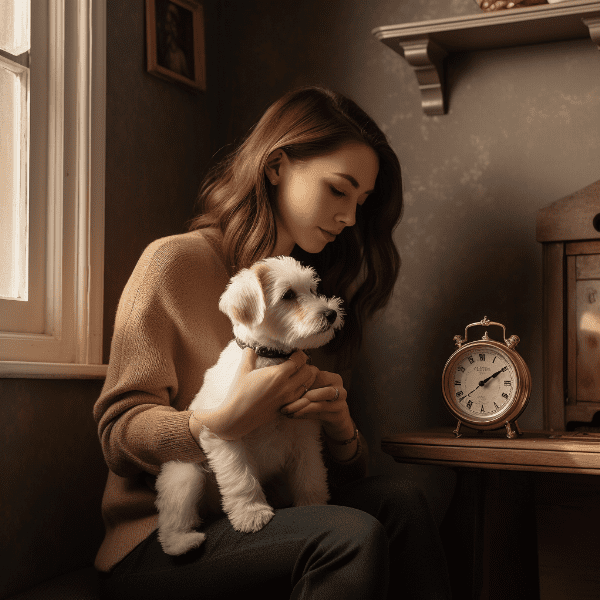
Avoiding Reinforcement of Whining Behavior
One of the biggest challenges when dealing with puppy whining at night is avoiding reinforcement of the behavior. It’s important to avoid inadvertently rewarding your puppy’s whining, as this can reinforce the behavior and make it more difficult to address.
Ignoring the Whining
In some cases, the best way to avoid reinforcing whining behavior is to simply ignore it. This can be difficult, as puppy whining can be quite persistent and difficult to ignore. However, if you’re confident that your puppy’s whining is not due to a physical need, it’s important to resist the urge to respond.
Using Positive Reinforcement
While it’s important to avoid reinforcing whining behavior, it’s also important to use positive reinforcement to encourage quiet nights. When your puppy is quiet and settled in their sleeping area, offer praise, treats, or a comforting pat on the head. This can help your puppy associate quiet behavior with positive rewards.
Seeking Professional Help
Avoiding reinforcement of whining behavior can be challenging, but it’s an essential part of addressing the issue and promoting restful sleep for both you and your furry friend. By ignoring the whining when appropriate, using positive reinforcement, avoiding punishment, maintaining consistency in training, and seeking professional help if needed, you can help your puppy learn to sleep peacefully through the night.

Using Positive Reinforcement to Encourage Quiet Nights
Positive reinforcement is an effective way to encourage your puppy to be quiet at night and promote restful sleep. By using positive reinforcement, you can help your puppy learn to associate quiet behavior with rewards, which can make it more likely that they will continue to exhibit that behavior in the future.
Offering Treats or Praise
One of the simplest ways to use positive reinforcement is to offer your puppy treats or praise when they’re quiet at night. When your puppy settles down and stops whining, offer a small treat or a gentle pat on the head to let them know that their quiet behavior is appreciated.
Using Clicker Training
Clicker training is a popular positive reinforcement technique that can be used to encourage quiet behavior at night. To use clicker training, you’ll need a clicker and some small treats. Click the clicker when your puppy is quiet, and offer a treat as a reward. This can help your puppy learn to associate the sound of the clicker with positive reinforcement.
Providing Comforting Words or Touch
Sometimes, all your puppy needs is a little comfort and reassurance to settle down at night. Offer soothing words or gentle touches to help calm your puppy and let them know that they’re safe and secure.
Creating a Reward Chart
Creating a reward chart can be a fun and effective way to encourage quiet behavior at night. Every time your puppy goes through the night without whining, add a sticker to the chart or offer a small reward, such as a new toy or a special treat. This can help your puppy feel motivated to continue exhibiting quiet behavior.
Remaining Consistent
Using positive reinforcement to encourage quiet nights can be a powerful way to address puppy whining and promote restful sleep. By offering treats or praise, using clicker training, providing comforting words or touch, creating a reward chart, and remaining consistent, you can help your puppy learn to sleep peacefully through the night.

Providing Appropriate Exercise and Stimulation
Puppies need plenty of exercise and mental stimulation to promote restful sleep and prevent nighttime whining. By providing appropriate exercise and stimulation, you can help your puppy expend their energy and feel more relaxed at night.
Regular Exercise
Regular exercise is essential for puppies to maintain physical and mental health. Aim to provide your puppy with at least 30 minutes of exercise each day, such as walking, playing fetch, or engaging in interactive playtime. Make sure to provide exercise earlier in the day to prevent excess energy at night.
Mental Stimulation
In addition to physical exercise, puppies also need plenty of mental stimulation to prevent boredom and anxiety. Provide your puppy with puzzle toys, treat dispensers, or other interactive toys to keep them engaged and mentally stimulated.
Training and Socialization
Training and socialization are important for puppies to develop good behavior and positive social skills. Provide your puppy with obedience training and opportunities to socialize with other dogs to prevent anxiety and stress that can lead to whining at night.
Avoiding Overstimulation
While exercise and stimulation are important, it’s also important to avoid overstimulation that can cause your puppy to become anxious or overexcited. Avoid high-energy activities or noisy environments in the hours leading up to bedtime.
Maintaining a Consistent Schedule
Maintaining a consistent schedule for exercise and mental stimulation can help your puppy establish a healthy routine and improve their overall sleep quality. Make sure to provide exercise and stimulation at the same time each day to prevent confusion and promote a natural sleep-wake cycle.
Providing appropriate exercise and stimulation is an essential part of preventing puppy whining at night. By providing regular exercise, mental stimulation, training and socialization, avoiding overstimulation, and maintaining a consistent schedule, you can help your puppy feel relaxed and tired at night, leading to a peaceful and restful sleep.
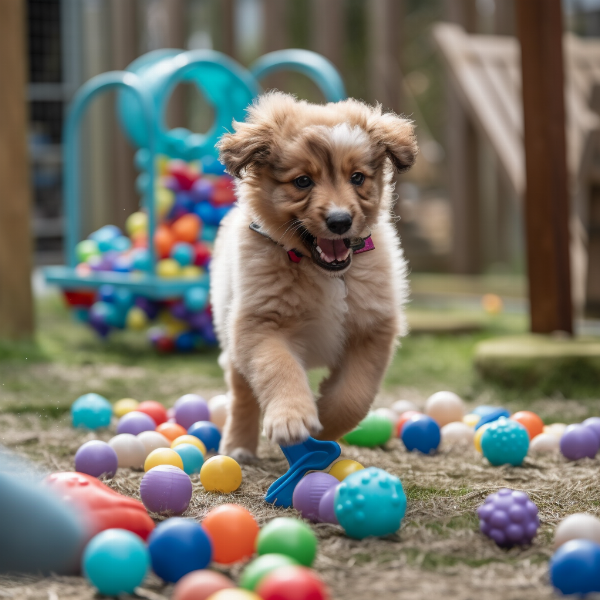
Addressing Possible Underlying Health Issues
In some cases, puppy whining at night may be caused by underlying health issues. If you’ve tried other strategies and your puppy’s whining persists, it may be time to consider a visit to the veterinarian to rule out any potential medical issues.
Pain or Discomfort
Pain or discomfort can cause your puppy to whine at night, especially if they’re suffering from an injury or illness. Watch for signs of discomfort, such as limping, panting, or decreased appetite, and consider a trip to the vet to address any potential issues.
Urinary Tract Infections
Urinary tract infections (UTIs) are common in puppies and can cause frequent urination and whining at night. If your puppy is exhibiting signs of discomfort while urinating, has accidents in the house, or is constantly whining at night, a UTI may be the culprit.
Separation Anxiety
Separation anxiety can cause your puppy to whine at night, even if they’re in the same room as you. If your puppy is exhibiting signs of separation anxiety, such as destructive behavior or excessive barking, consult with your vet or a professional dog trainer to develop an appropriate treatment plan.
Other Health Issues
Other health issues, such as allergies or respiratory problems, can also cause your puppy to whine at night. If you suspect that your puppy’s whining is related to a health issue, consult with your vet to determine the best course of action.
Addressing possible underlying health issues is an important part of preventing puppy whining at night. By watching for signs of pain, discomfort, digestive issues, UTIs, separation anxiety, and other health issues, you can ensure that your puppy is receiving appropriate medical care and addressing any potential causes of nighttime whining.
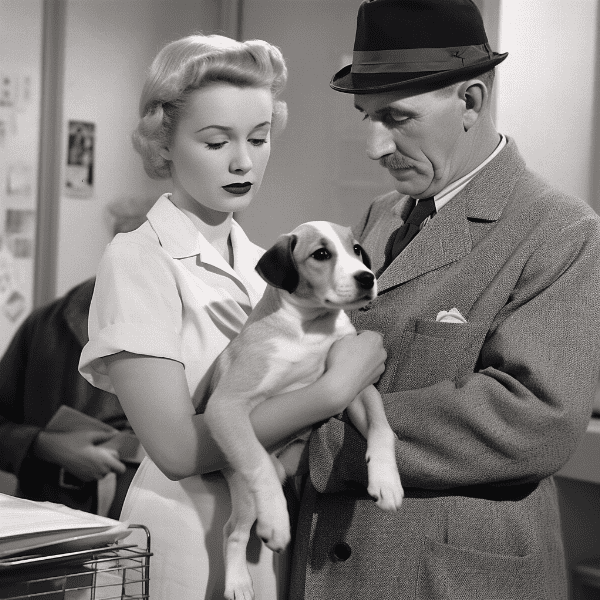
Utilizing Calming Aids and Remedies
If your puppy is experiencing persistent whining at night, despite your best efforts to address the behavior, it may be time to consider utilizing calming aids and remedies. There are a variety of products and techniques available that can help your puppy feel more relaxed and secure at night.
Calming Supplements
Calming supplements, such as chamomile or melatonin, can help promote relaxation and reduce anxiety in dogs. Talk to your vet about the best options for your puppy and the appropriate dosage.
Essential Oils
Essential oils, such as lavender or chamomile, can also have a calming effect on dogs. Use a diffuser or apply a small amount of oil to your puppy’s bedding to help promote relaxation.
Anti-Anxiety Clothing
Anti-anxiety clothing, such as ThunderShirts or anxiety wraps, can provide gentle pressure that can help calm your puppy and reduce anxiety.
White Noise Machines
White noise machines or calming soundtracks can provide soothing background noise that can help mask any potential noises or distractions that may be causing your puppy to whine at night.
Crate Training
Crate training can provide a safe and secure sleeping area for your puppy and can help reduce anxiety and whining at night. Make sure to introduce crate training gradually and provide plenty of positive reinforcement to help your puppy feel comfortable and secure in their crate.
Utilizing calming aids and remedies can be an effective way to address persistent puppy whining at night. By using calming supplements, essential oils, anti-anxiety clothing, white noise machines, crate training, or other techniques, you can help your puppy feel more relaxed and secure, leading to a better night’s sleep for everyone.
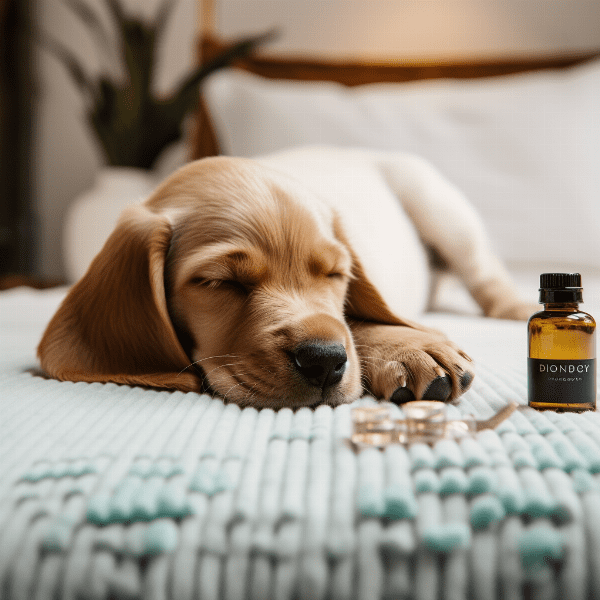
Seeking Professional Help if Needed
If your puppy’s whining at night persists despite your best efforts to address the behavior, it may be time to seek professional help. A professional dog trainer or behaviorist can provide targeted strategies and guidance to address the underlying causes of your puppy’s whining and help you develop a plan to promote restful sleep.
Benefits of Professional Help
Professional help can provide a variety of benefits when it comes to addressing puppy whining at night. A professional can help identify the underlying causes of the behavior and provide targeted solutions to address the problem. They can also provide guidance on training techniques, behavior modification, and other strategies to promote restful sleep for both you and your furry friend.
Choosing a Professional
When choosing a professional to help with your puppy’s whining at night, make sure to do your research and find someone who is experienced, qualified, and reputable. Look for professionals who use positive reinforcement techniques and have a strong track record of success.
The Importance of Consistency
Consistency is key when it comes to addressing puppy whining at night, and working with a professional can help ensure that everyone in the household is on the same page and following a consistent plan. Make sure to follow the professional’s guidance and remain consistent in your training and behavior modification techniques.
Other Benefits of Professional Help
In addition to addressing puppy whining at night, working with a professional can also provide other benefits for your puppy’s overall behavior and well-being. A professional can help with obedience training, socialization, and other aspects of puppy development that can improve their behavior and quality of life.
If your puppy’s whining at night persists despite your best efforts, seeking professional help can be an effective way to address the issue and promote restful sleep for both you and your furry friend. By choosing a qualified professional, remaining consistent in your training techniques, and taking advantage of the other benefits of professional help, you can help your puppy develop positive behaviors and enjoy a better night’s sleep.
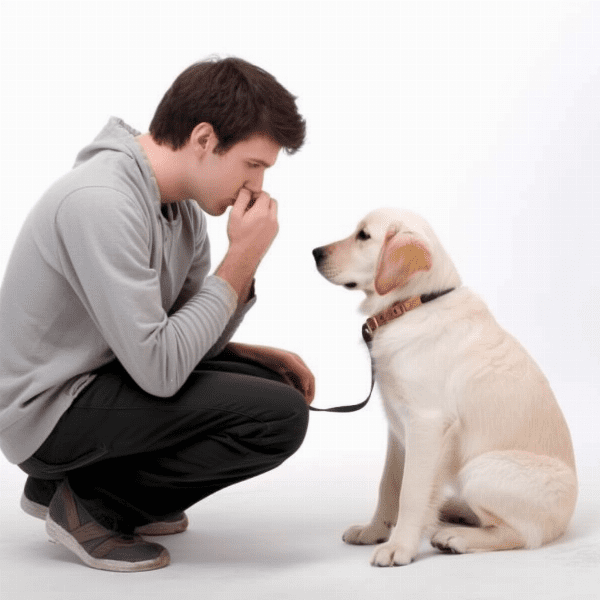
Maintaining Consistency and Patience in Training.
Training a puppy to sleep peacefully through the night can take time and effort, and it’s important to maintain consistency and patience throughout the process. By remaining consistent in your training techniques and patient with your puppy’s progress, you can help promote positive behaviors and achieve a better night’s sleep for both you and your furry friend.
Understanding the Importance of Consistency
Consistency is key when it comes to training a puppy to sleep through the night. Make sure that everyone in the household is on the same page and using the same training techniques and strategies. This can help prevent confusion and ensure that your puppy is receiving clear and consistent messages.
Emphasizing Positive Reinforcement
Positive reinforcement is a powerful training technique that can help encourage positive behaviors and reduce negative behaviors. Use treats, praise, or other rewards to reinforce positive behaviors, such as quiet behavior at night.
Avoiding Punishment
Punishment is not an effective training technique and can actually make whining behavior worse. Avoid scolding, yelling, or physically punishing your puppy for whining at night. Instead, focus on positive reinforcement techniques and addressing any underlying issues that may be contributing to the behavior.
Staying Patient
Training a puppy to sleep through the night can take time and patience. Remember to stay patient with your puppy’s progress and avoid getting frustrated or discouraged. Consistency and positive reinforcement can help promote positive behaviors over time.
Adjusting Your Approach as Needed
Every puppy is different, and what works for one may not work for another. Be willing to adjust your approach as needed and try different techniques and strategies to find what works best for your furry friend.
Maintaining consistency and patience in training is essential for promoting positive behaviors and addressing puppy whining at night. By understanding the importance of consistency, emphasizing positive reinforcement, avoiding punishment, staying patient, and adjusting your approach as needed, you can help your puppy develop healthy sleep habits and enjoy a better night’s sleep.


